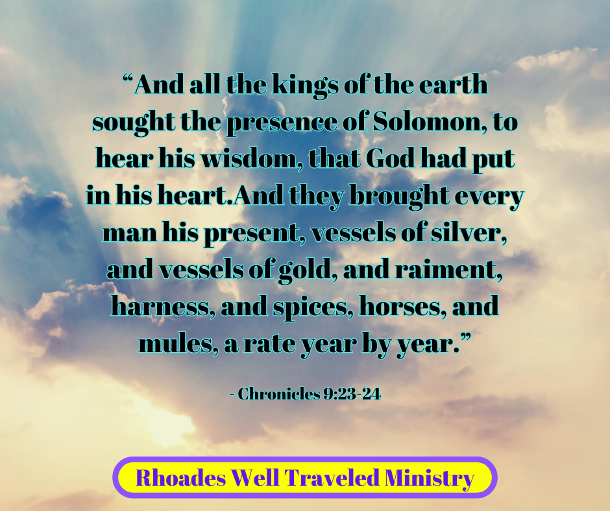GOD'S WORD
▬ Peace made with Hamath: the spoils of war dedicated to God ▬
January 20, 2024

Reverend Danny Rhoades
Good day Brothers and Sisters. Before I start on my Daily Devotional, I want to read the following KJV Bible Verses to you:
1 Chronicles 18:9
Now when Tou king of Hamath heard how David had smitten all the host of Hadarezer king of Zobah;
1 Chronicles 18:10
He sent Hadoram his son to king David, to enquire of his welfare, and to congratulate him, because he had fought against Hadarezer, and smitten him; (for Hadarezer had war with Tou;) and with him all manner of vessels of gold and silver and brass.
The peace treaty between King David and Hamath marked a significant moment in the history of ancient Israel. As a renowned military leader, King David had embarked on numerous conquests, expanding the boundaries of the Israelite kingdom. This delotional explores the spoils of war dedicated to God in the aftermath of these military campaigns, specifically focusing on the peace treaty with Hamath mentioned in 1 Chronicles 18:9-10. By examining the historical context, the significance of spoils of war, and the religious implications of dedicating them to God, we gain insight into the diplomatic efforts, religious practices, and the lasting impact of this peace treaty on the kingdom of Israel.
Ah, King David - the biblical rockstar of ancient times. Known for slaying giants and penning beautiful psalms, this guy had quite the eventful reign. David ruled the Israelite kingdom with gusto, expanding its territories and establishing Jerusalem as the capital.
But even a king as mighty as David faced his fair share of conflicts. One such tiff was with Hamath, a city-state located in modern-day Syria. Tensions arose, and swords clashed as armies fought for land and power. However, as they say, all's well that they say, all's well that ends well, and this particular skirmish between David and the people of Hamath culminated in a peace treaty. Quite the plot twist, wouldn't you say?
Now, let's talk about King David's military prowess. This dude knew how to conquer some lands! During his reign, the Israelite kingdom experienced a growth spurt like no other. David's army marched and conquered, expanding the borders of his domain and solidifying his rule.
Think of King David as the real-life version of a video game character, earning XP and leveling up with every battle won. From the Philistines to the Ammonites, David's army was unstoppable. His victories weren't just minor triumphs; they resulted in tangible territorial gains. The territorial gains. The Israelite kingdom flourished under his leadership, and his conquests are still talked about to this day.
When it comes to war, there's often more to gain than just glory and bruises. In ancient times, the spoils of war were a big deal. These were the shiny, valuable prizes that warriors claimed after a victorious battle. We're talking gold, silver, fancy weapons, and perhaps even a few wild war elephants thrown in for good measure.
While the material value of spoils was obvious, there was also a symbolic significance to them. These spoils served as a testament to the victor's strength and dominance. It was like saying, "Look at all this loot I've got! Bow down to my awesomeness!" Okay, maybe they didn't say it exactly like that, but you get the idea.
In ancient Israel, religion played a significant role in the lives of its people. So, naturally, when it came to spoils of war, they didn't stop at showing off to their enemies. Oh no, they believed in dedicating their spoils to their almighty God. It was sort of like saying, "Hey God, I know you helped me win this battle, so here's a little something to say thanks."
Throughout biblical history, we see examples of people dedicating spoils of war to God. They built fancy temples, adorned them with exquisite treasures, and basically threw a divine housewarming party. It was a way for the victorious to show their gratitude and honor to God, with a splash of flair and style.
So, there you have it, the tale of King David's peace treaty with Hamath and the spoils of war dedicated to God. It's quite the fascinating saga, blending the thrill of conquest, the value of shiny things, and the deep religious convictions of ancient Israel. Who knew war and peace could be such a captivating mix?
Negotiating peace treaties is like trying to assemble furniture from a Swedish store without the instruction manual - a delicate process that requires patience, strategic thinking, and a lot of hand gestures. In the case of the peace agreement with Hamath, King David flexed his diplomatic muscles and engaged in intense negotiations.
Imagine King David sitting at a grand table, eloquently presenting his case while trying not to spill his drink. He probably had a list of demands that would make any attorney proud - land concessions, trade agreements, and an all-you-can-eat buffet at the Imagine King David sitting at a grand table, eloquently presenting his case while trying not to spill his drink. He probably had a list of demands that would make any attorney proud - land concessions, trade agreements, and an all-you-can-eat buffet at the local deli. Diplomats from both sides huddled together for days, debating terms and trying to find common ground. It was a high-stakes game of give and take, with clenched fists replaced by handshakes (hopefully without any discreetly crossed fingers).
After many rounds of negotiations, a peace treaty was finally agreed upon. The terms were like a carefully crafted recipe - a pinch of this, a dash of that, and voila! A harmonious coexistence between the kingdoms of Israel and Hamath was born.
The treaty included land concessions, trade partnerships, and the establishment of diplomatic relations. It was a win-win situation, leaving both sides satisfied (well, as satisfied as you can be after compromising on your favorite slice of territory). The terms aimed at fostering stability in the region and promoting peaceful interactions between the two kingdoms. It was a shining example of diplomacy at its finest, proving that wars can indeed end without resorting to a thumb war or a game of rock-paper-scissors.
When it came to dedicating spoils of war to God, King David wasn't one to miss a chance to show off his faith. After the victory over Hamath, he decided to take a moment and dedicate the spoils to the big guy upstairs. It was like giving God a shout-out on social media, except instead of a selfie, it was a display of the conquered riches.
In ancient times, dedicating spoils to God was a way of acknowledging divine intervention and giving thanks for the victory. It involved elaborate rituals, grand processions, and probably some interpretive dance moves (though we can't be too sure about that last part). It was a way of saying, "Hey, God, thanks for having our backs. Here's a little something for you to enjoy."
Dedicating spoils of war to God wasn't just a show of gratitude; it was also a testament to the faith and belief of the people. It demonstrated their trust in a higher power and their acknowledgement that success was not solely their doing. It was a reminder that even the mightiest of armies needed a little divine intervention now and then.
So, while dedicating spoils to God might seem a bit peculiar to us modern folk, it was a way for ancient societies to express their faith and to give credit where credit was due. It was a reminder that victories on the battlefield and in life were not solely the result of human strength, but rather a partnership between mortal and deity.
With the peace treaty in place, the kingdom of Israel experienced a wave of benefits and stability. It was like hitting the jackpot at a local fair - all of a sudden, everything fell into place, and life became a little brighter.
The treaty brought an end to hostilities and created a newfound sense of security for the Israelites. It opened up opportunities for trade, cultural exchange, and collaboration between the two kingdoms. The benefits of peace were like a refreshing breeze on a scorching hot day - a welcome respite from the chaos and uncertainty of war.
While the peace treaty brought harmony on a larger scale, it also had political and social repercussions within Israel. It was like throwing a wild party - sure, it was fun, but there were also some unexpected consequences the next day.
The treaty challenged the status quo and required adjustments in governance and administration. It forced the Israelites to adapt to a new reality and embrace cultural diversity within their borders. It was a test of their ability to coexist with their former adversaries and build a stronger, more inclusive society.
The peace treaty with Hamath taught us a valuable lesson about the power of gratitude and faith. By dedicating spoils of war to God, King David and his people acknowledged the role of a higher power in their victories. It reminded them to remain humble, even in times of triumph, and to always recognize the divine forces at play.
Looking back at the peace treaty with Hamath, we can see its historical and moral significance. It serves as a reminder that wars can be resolved through diplomacy and negotiation, rather than bloodshed and destruction. It highlights the importance of finding common ground and striving for peaceful coexistence, even with former enemies.
Brothers and Sisters In a world often plagued by conflicts, the peace treaty with Hamath stands as a beacon of hope. It challenges us to reconsider our approach to resolving disputes and encourages us to seek peaceful solutions. As we reflect on this ancient tale, let us remember that peace is not only the absence of war but also the presence of understanding, compassion, and a willingness to extend a hand in friendship.
In conclusion, the peace treaty with Hamath not only brought stability and prosperity to the kingdom of Israel but also highlighted the religious beliefs and practices of ancient Israelites. The dedication of spoils of war to God served as a reminder of their faith and dependence on divine guidance. Through this historical account, we can reflect on the significance of dedicating the spoils of our victories to something higher than ourselves. It teaches us the importance of gratitude, humility, and recognizing the role of faith in times of triumph. The peace treaty with Hamath stands as a testament to the power of diplomacy, religious devotion, and the impact of war and peace on the ancient world.


Exercise caution in your business affairs; for the world is full of trickery. But let this not blind you to what virtue there is; many persons strive for high ideals; and everywhere life is full of heroism.
Join us in spreading God's love and compassion to those in need.



